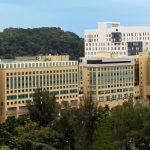Scholarship: Full scholarship
Degree: PhD, MD
Nationality: International Students
Location: Denmark
Application deadlines: May 2, 2023
Scholarship Description:
The University of Southern Denmark, founded in 1966, is located in the south of Denmark and has a worldwide reputation for study and research, with beautiful surroundings and state-of-the-art teaching facilities, five modern libraries, laboratories and a computer information network. The University of Southern Denmark is the result of a merger between the Southern Danish School of Business and Engineering, the University of Odense and the University of Southern Jutland and has four campuses – Odense, Kolding, Esbjerg and Flensborg – with the main campus in Odense, which was established in 1966. The University of Southern Denmark is a comprehensive university with more than 50 specialist fields of study and students can choose from a wide range of programmes from undergraduate to doctoral level. The faculties are divided into 33 departments and 29 research centres. The university offers higher education programmes from undergraduate to post-doctoral level in a wide range of traditional disciplines, and the University of Southern Denmark has a worldwide reputation in communication, information technology, engineering and life sciences. The University of Southern Denmark was one of the first Nordic universities to offer a Master’s programme taught in English.
The University of Southern Denmark is ranked between 201 and 300 in the world in the 2019 Times Higher Education Rankings and is the sixth highest ranked university in Denmark, after the University of Copenhagen, Aarhus University, Technical University of Denmark, Aalborg University and Copenhagen Business School.
Available Subjects:
Position 1: PhD in computer science/cheminformatics/applied mathematics
We are looking for PhD candidates to join the Marie-Sklodowska-Curie Joint Doctoral Network of TACsy (Training Consortium for Computational Systems Chemistry).
Project information: Development of new theoretical concepts and software implementations to describe the dynamics of multi-scale and multi-angle rule-based chemistry. This includes the development of a stochastic simulation engine for rule-based reaction systems, on the basis of which a new framework for the analysis of stochastic trajectories in the space of dynamic changes is employed. Departing from algebraic approaches like chemical organisation theory (10.1007/s11538-006-9130-8, 10.1137/21M13967), we will make particular use of systems that generate new components through their constituent interactions, thus effectively changing the state space in which these components live. This will open up a new perspective on highly diverse molecular systems, including examples of chemical evolution, polymer formation, enzyme synthesis design, lipidomics, prebiochemistry or multifunctional phase-separated protein complexes in biological cells.
The PhD project will be carried out jointly by the University of Jena (Peter Dittrich) and the University of Vienna (Christiph Flamm). In addition, the student will have a research stay at Harvard Medical School (Walter Fontana).
Position 2: PhD in Molecular Systems Engineering
Project information: Situated at the interface of chemistry and bio/chemical engineering, this position aims to develop new computational techniques for the design of multi-enzyme cascades (MEC) for applications. It is difficult to upgrade chemicals such as caffeine into more valuable products using traditional synthetic methods, but strategies involving MECs are emerging and the use of enzymes found in cell extracts has been shown to be effective under certain conditions. The computational approach allows us to explore the diversity of the MEC design space on the computer prior to implementation in the wet lab, and will therefore greatly accelerate the process of developing productive MECs. The project will involve an investigation of potential routes using computational techniques at the University of Vienna and a nine-month secondment to the University of Sheffield to develop microfluidic methods for optimising encapsulated cell extract processes. You will also have a short secondment to Fluigent for microfluidics training.
Position 3: PhD position in Computer Science/Chemical Informatics
Project information: In this project, the PhD student will focus on computational and declarative methods for modelling and solving multi-enzyme cascade design problems. Chemical aspects of modelling and optimisation include: modulation of enzyme metastability, competitive inhibition of active sites, cofactor cycling, switching between different modes of operation and overall autocatalytic behaviour. The candidate will develop such methods and perform extensive in-computer testing. Our aim is to compare and evaluate the computational tools developed in this project with wet-lab data generated in other TACsy projects. The student will work with our industrial partner (Fluigent) for a period of three months, focusing on microfluidic and lab-on-a-chip technologies.
Contact information:
For further information, please contact Daniel Merkle on +45 6550 2322 or e-mail: [email protected]


